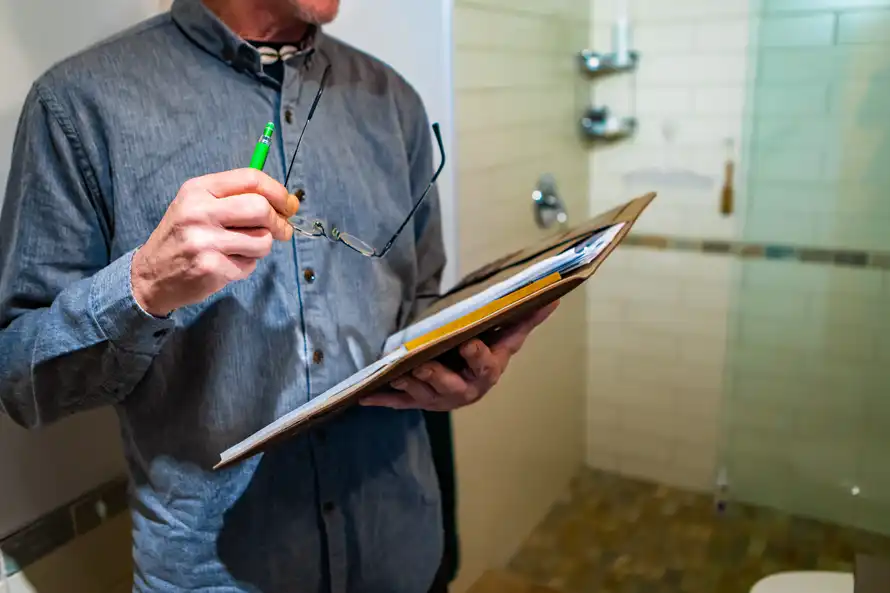What is a Pre-Listing Home Inspection for Sellers?
Regardless of the state of the market, selling your home can be a complicated, time-consuming experience. Your to-do list is already full, so why would you add unnecessary items? Well, if it adds value or may help expedite the sale, why not? You may have heard of a pre-listing inspection, sometimes called a pre-sale inspection, but what exactly is it, and is it worth the added effort? Here, we’ll go over everything you need to know about pre-listing home inspections for sellers, including their benefits and drawbacks.
What is a Seller’s Pre-Inspection?
A seller’s pre-listing inspection is when a professional home inspector assesses your house before putting it on the market. Typically, the buyer is responsible for scheduling a home inspection and likely still will, regardless of your inspection report. However, pre-inspections give sellers an idea of things that need to be addressed to get on top of any issues and list the house at a more competitive price.
Whether you repair any issues outlined in the report is up to you, but knowing them ahead of time can help you determine an acceptable offer.
The Difference Between a Pre-Listing Inspection and a Home Inspection
The biggest difference between a standard home inspection and a pre-listing home inspection is who pays for it. Typically, the buyer will pay for the inspection during the closing process. The seller covers the cost of a pre-listing inspection.
How Much Does a Pre-Listing Home Inspection Cost?
The cost of a home inspection varies based on the size of your house and the age of the home. For an average house, HomeAdvisor estimates that this can be somewhere between $280 to $400. Still, home inspectors charge different rates for different markets, home sizes, and square footage, so it really depends.
Usually, you’ll be able to get a quote from your prospective home inspection company before moving forward with the report. When you’re ready to sell your house, and you want to include a pre-sale report, try getting quotes from a few reputable home inspectors to see your options.
What Happens During a Pre-Listing Home Inspection?
A pre-listing inspection may be as thorough as you’d like your inspector to be. If you want to learn about every single issue with the home, that can be arranged, but it’s unnecessary. Oftentimes, these inspections focus on specific concerns sellers have to determine an acceptable sale price.
For example, if you suspect issues with your property grade or foundation, a home inspection gives you more detail about potential issues. Or, you may just want to have your inspector go through a regular home inspection checklist so you know what the buyer’s home inspection results will be. Some things a pre-listing home inspection covers include:
The foundation or structural stability
The house’s framing
Water quality
Checking for lead paint or asbestos
The state home’s exterior, such as the siding and roof
Evaluating the lifespan of a roof
The quality of DIY remodels
Assessing the windows, walls, and doors
Evaluating the standards of ceilings and basements
Plumbing
Electrical systems
Attic and insulation
The HVAC system
Benefits of a Pre-Listing Inspection
There are some advantages to getting an inspection before listing your home. It’s best to work with your listing agent or an experienced real estate agent to ensure that these benefits apply to you and your home before paying for the inspection. Still, some advantages of a pre-sale home inspection include:
You Get Ahead of Repairs — If your pre-sale home inspection shows some issues, it gives you a chance to make repairs before listing. Typically, this leads to a higher home value.
Eliminate Buyer Requests for Concessions — Repairs done before listing also reduce the risk of buyer requests for concessions. This means you won’t lose money from plumbing issues that would have been cheaper to repair before listing your home for sale.
Increase Attractiveness to Buyers — Pre-listing inspection reports that return extremely positive can be used to market your listing, increasing the pool of interested buyers. Plus, positive reports can help you increase more serious buyers, resulting in several cascading benefits.
Potential to Close Faster — Pre-listing inspections may help you expedite the home sale process, as they allow you to proactively fix issues rather than waiting to address them during closing.
Increase Listing Price — If you take action on any issues outlined in the report, you’ll likely be able to increase your listing price and get more from selling your home. Your real estate agent will be able to help you navigate the best price for the current market.
Avoid Any Unpleasant Surprises — When you get a complete report, you’ll know what to expect when the buyer has their certified home inspector pay a visit. This can help give you peace of mind when selling a house and reduce the risk of unpleasant or costly surprises.
Drawbacks of Getting a Pre-Listing Inspection
Homeowners who want to get a pre-listing inspection before putting their house on the market should also consider a few of the drawbacks.
You’ll Need to Disclose Unfavorable Findings — Any negative findings from the report will likely need to be included in your home’s marketing or listing. The world of real estate requires some transparency, so this could become problematic if you don’t have the funds to make repairs for major issues.
You Need to Pay Out of Pocket — Although the report can help increase value, you’ll need to pay for it on your own before selling your house. Since it’s not technically mandatory, some sellers find it redundant since the buyer will inspect your home anyway.
You May Need to Make Unnecessary Repairs — Everyone has different priorities when buying a home. The repairs you make when preparing to sell your home may not have bothered the buyer, which means wasted time, energy, and money. Unfortunately, you don’t know what the buyer will notice or care about, making it difficult to determine the benefit of taking action after a pre-inspection.
It May Conflict with the Buyer’s Inspection — Sometimes, the two home inspections may yield different results. It depends on the inspector, but this may create tension about which inspection is right or accurate. Likely, the buyer will trust whichever one identifies more issues, which could impact the timeline of the sale and decrease a buyer’s offer.
Should You Get a Home Inspection Before Listing?
When you go to list your home on the market, you might wonder about the true condition of your home. An inspection can help you learn more about this, but it’s not always necessary. The best way to determine whether getting a pre-inspection is worth it is to work with your real estate agent. A pre-listing inspection may shed valuable insight into older homes with several owners. However, newer homes without DIY home improvements don’t typically elicit many reasons to get one. The inspection isn’t necessary, and the buyer will still order a full inspection to assess the condition of the home before closing.
However, having a finalized pre-inspection report could make your home more attractive to buyers and help expedite the sale. Potential buyers may see it as a good sign, which can help you sell your house faster. Again, if you’re unsure, consult your real estate agent to weigh the pros and cons.
Partner with a Reputable Real Estate Agent to Get Your Home Ready for Sale
Navigating the real estate process can be complex and confusing, but it’s necessary to get the most out of your home-selling journey. When you’re getting ready to put your house on the market, turn to the team at First Star Realty.
Our team of real estate professionals has years of practice and knowledge and always works to ensure you have an amazing experience. We truly believe we haven’t done our job if you don’t have an amazing experience with our realty services. If you’re ready to buy or sell a home in Northwest Arkansas, contact First Star Realty. Our experienced real estate agents are dedicated to providing exceptional, personalized service to our clients. Call us at 479-267-1600 to get started, or fill out a contact form today.



